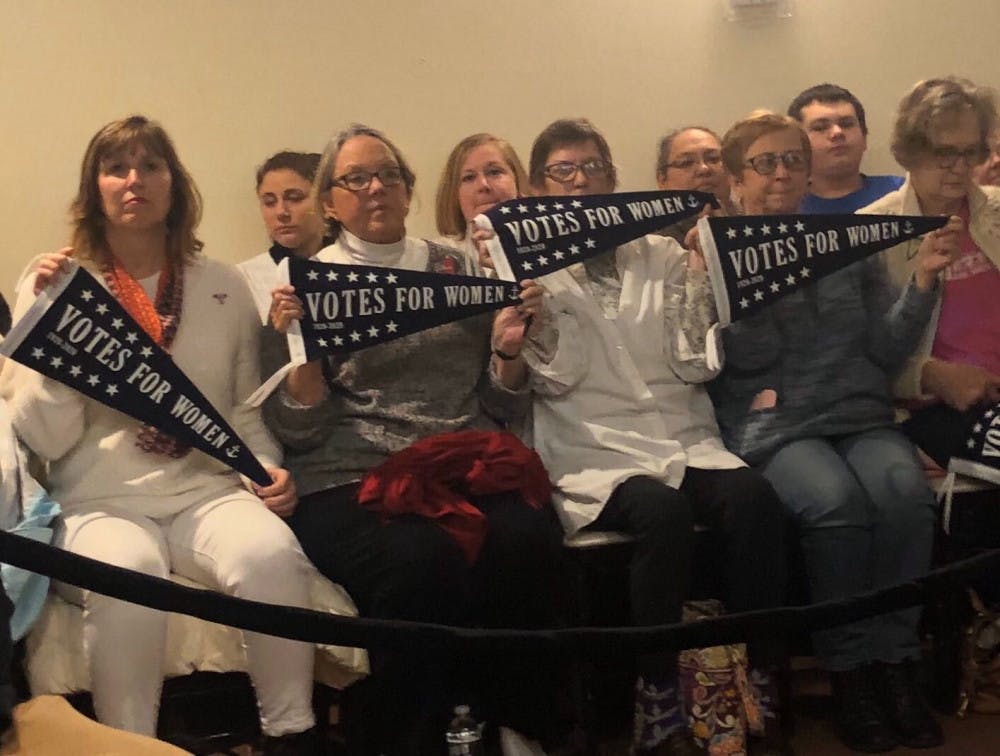The Rhode Island Democratic Party Women’s Caucus announced the establishment of a separate allied offshoot unaffiliated with the party called “the Rhode Island Democratic Women’s Caucus” at a press release Nov. 19.
The new group grew out of concerns about new State Committee bylaws, which prohibit the Democratic Party Women’s Caucus from endorsing and fundraising for their own candidates or making statements without approval from the chair of the party. The original women’s caucus has more than 600 members and is the most vocal out of the caucuses in the R.I. Democratic Party, according to State Senator Gayle Goldin, D-Providence, one of the original co-chairs of the caucus. Goldin said that the new bylaws would impact all other Democratic Party-affiliated caucuses, including the LGBTQ+ Caucus and the Veteran’s Caucus.
Chair of the Rhode Island Democratic Party Joseph McNamara, who leads the State Committee, did not respond to The Herald’s questions by press time.
The Rhode Island Democratic Party Women’s Caucus established the new branch separate from the party a week before the official hearing in which the bylaws were passed, as soon as they realized the bylaws were likely to pass, according to Liz Gledhill, chair of both the old and new caucuses. While the Rhode Island Democratic Party Women’s Caucus still exists, it is effectively replaced by the new caucus, which is taking over its fundraising and other activities.
“If the bylaws were applied immediately, we would be prohibited from functioning the way we always have,” Gledhill said. “We always had a (political action committee), we always endorsed, we always spoke for ourselves — and under the new rules we are not allowed to.”
Gledhill said the foundation of this new group will maintain the caucus’ autonomy despite the new bylaws. Independent of the state Democratic Party, the new caucus will focus on continuing to fundraise for female candidates’ campaigns as well as offer trainings for candidates and volunteers about how to run better campaigns.
“Female candidates are always at a disadvantage to their male counterparts, and we want to make sure they are supported in every way that they can be,” Gledhill said.
The new caucus has received an influx of support since its establishment, according to Gledhill. She said that the caucus had more sign-ups last week than the old caucus ever had, and has raised $3,800 for their PAC in the last few weeks.
Gledhill highlighted that she was surprised that a large proportion of the donations and support came from men who endorse the cause. “It’s not enough just to show up and say, ‘oh I am supportive,’ but also to donate to a cause that you are not necessarily going to benefit from … shows what a real ally is,” she said.
In a statement to the Providence Journal, McNamara said the bylaws are about having the party on the same page to win elections.
“It will help make the party more united. I think if we looked at the members who voted, 70 percent of the women (voting) who were state committee members supported the rule changes because they realize that if we have every caucus endorsing individuals on their own, it will be very difficult going forward into the election season,” McNamara told the Providence Journal.
Gledhill said that the caucus had been frustrated by the discrepancy between candidates they felt were “real Democrats” and the ones the party chose to endorse. “Last year during the Reproductive Privacy Act hearings we had Democratic senators reading the Bible and condemning women to burn in eternal hell for having an abortion. That’s a Democrat that the party endorses and I don’t think women should be forced to endorse a senator like that,” Gledhill said. She added that if they felt it were possible, “it would be great to remain in our party and bring change from within.”
Gledhill highlighted that unity is extremely important especially with next year as a crucial election year, but she stressed that it should be achieved through active collaboration.
“I don’t believe unity is agreeing on everything,” she said. “Unity is having the similar principles, and being able to discuss your differences, and being able to learn from them and learn how to draw strength from differences and not divide and push away.”
Brown Progressive Action Committee Chair Jenna Israel ’21 viewed the founding of the new caucus as an unsurprising but disappointing necessity in the context of more moderate and conservative tendencies of the Democratic Party in Rhode Island.
“It’s an institutional problem with the Rhode Island Democratic Party that is so conservative, so white, so male, that it just doesn’t allow room for groups like the women’s caucus to grow,” she said.





